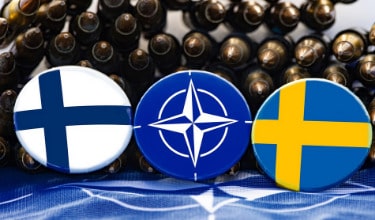Law students from the European Union are reporting for JURIST on law-related events in and affecting the European Union and its member states. Letizia Ailio is a law student at Maastricht University in the Netherlands. She files this dispatch from Maastricht.
One of the unintended consequences of Vladimir Putin’s invasion of Ukraine has been the applications of Finland and Sweden to join NATO. The two militarily non-aligned countries have completely changed their traditional stance on military involvement. Since they announced their intention to join the Western alliance, speculation has raged on the timing and conditions for their memberships, especially as two other countries have held up ratification.
Where does the process stand today? Will Finland and Sweden walk down the aisle together to full membership in NATO?
I recently traveled to wintery Helsinki to find out the latest and had a chance to speak with Sari Lehtiranta, Deputy Director General of the Ministry of Foreign Affairs of Finland, about Finland and Swedan’s road to NATO membership and what challenges the two countries still face. This is what I learned.
The war in Ukraine played a major role in radically changing public opinion in Finland and Sweden about Russia in just a matter of weeks. This prompted the two governments to apply for NATO membership last May, after large majorities in their perspective parliaments lent their support to the move (endorsed 188 to 8 in the Finnish parliament, for example). A record-breaking ratification process started, with 28 out of 30 NATO countries formally approving their entry in less than a year. However, two countries have yet to give their approval: Hungary and Türkiye.
Hungarian prime minister Viktor Orban has given different statements about the protracted NATO ratification process in his country. Earlier this year he predicted that Hungary’s parliament would conclude its deliberations on the applications in early March, but on 24 February he raised concerns about what he called “outright lies” by Sweden and Finland about the state of Hungarian democracy and rule of law. Subsequently, his Chief of Staff opined that ratification will not occur before 21 March. Hungary’s ruling Fides Party plans to send a delegation to investigate the contentious issues in Sweden and Finland.
Türkiye in turn has voiced concerns about the two candidate countries protecting Turkish terrorists or anti-government individuals. The PKK, a Turkish political party fighting for independence for the Kurds, has been designated a terrorist organization in several countries including Türkiye. Sweden and Finland, however, protect PKK members and members of other Turkish extremists groups from demands for their expulsion. Both Finland and Sweden point out that their laws do not allow for the extradition of individuals that have not broken their national law. After intense diplomatic pressure by the US and other NATO allies, however, and a Quran burning scandal in Stockholm, Turkish president Erdogan has seemingly started to change his mind as regards the equal treatment of the two candidate countries, and has publicly given hints that Türkiye would accept Finnish membership before that of Sweden.
On March 1 2023, the full legislature of the Finnish parliament gave its final approval also for the NATO membership treaty, ahead of the parliamentary elections scheduled in late March. The vote was a replay of May, passing with a large majority (184 for, 7 against), cementing Finland’s decision to join the alliance.
Finnish President Sauli Niinstö has confirmed that Finland will go ahead with its membership process, preferably together with Sweden, but the timing is in the hands of Türkiye.
Due to its shared border with Russia and past conflicts, Finland has developed a robust military and maintained a stance of military neutrality for a considerable time. Finland and Sweden have modern armed forces that are largely compatible with NATO standards. For instance, Finland has purchased highly advanced weapons systems, mainly from the US. These include missile systems capable of long-range action if the country were under real threat. Finnish military spending reached 2.03% of its GDP in 2021, whereas Sweden has vowed to raise its current figure (1.28% in 2021) to meet the NATO target of 2%. However, Finland has made clear that it does not want any NATO military bases on its soil.
As we have seen in recent months, surprises are always possible in the ratification process for Finland and Sweden’s NATO membership. For example, the Quran burning incident in Sweden last year caused a delay in Turkish ratification. And just this week, there was a provocative incident in Helsinki where a photo of President Erdogan was burned in front of a Turkish Embassy. I am curious to see how Türkiye responds to this last development and if it affects their stance on Finland and Sweden’s applications.
